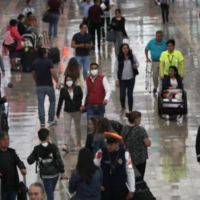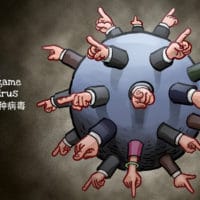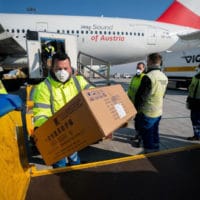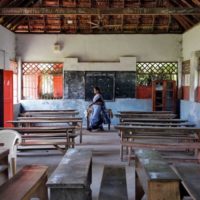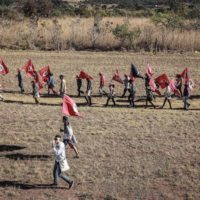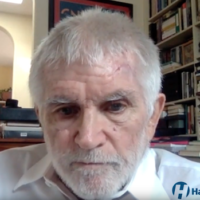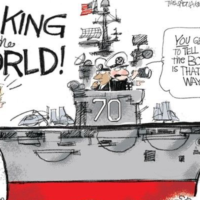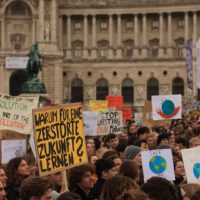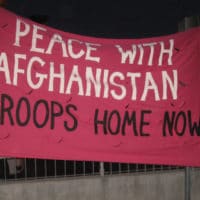-
Covid-19: the pandemic of the Great Acceleration
Many people around the world are familiar with this ancient Chinese proverb. Today, this lovely metaphor has materialized and taken the form of a pandemic, wreaking havoc on a system where few felt safe and most had become accustomed to merely surviving.
-
What can normalcy bring?
With COVID-19 figures flattening downward, Germany is limping back to some kind of normalcy. Auto and bike shops, book dealers, barbers and most shops less than 800 m2 can now re-open (with customers 5 ft apart). Bigger shops and department stores are squabbling: “Why not us?”
-
How China broke the chain of infection
As information about coronavirus emerged, the Chinese government and Chinese society began to organize an immense campaign against its spread.
-
Pandemic story: failures, forebodings, signs of solidarity
A great hazard looms. Under duress and as chaos mounts, capital may find it useful to revert to the extremist, even brutal, measures figuring in its past.
-
Avoid austerity to prevent a state and local coronavirus depression
Local budget cuts enacted a decade ago left states and cities dangerously unprepared for COVID-19. We shouldn’t make those same mistakes again.
-
The Social Democratic pipedream
Today in the United States, there has been an upsurge in social democracy/democratic socialism (I use these terms interchangeably; I don’t see much difference between them, at least in the U.S.) The main current of social democracy is the Democratic Socialists of America (DSA), whose overall political perspective can be described as follows.
-
Kerala is a model state in the Covid-19 fight
This overlooked region of India is a beacon to the world for taking on the coronavirus, with the leftist government setting the bar for testing, tracing and treatment standards.
-
Cuba: from AIDS, Dengue, and Ebola to COVID-19
Cuba’s preparation for COVID-19 began on January 1, 1959. On that day, it laid the foundations for what would become the discovery of novel drugs, bringing patients to the island, and sending medical aid abroad. Coping with HIV/AIDS, dengue fever and Ebola helped Cuba develop the ability to cope with pandemics, both internally and abroad.
-
How “just-in-time” capitalism spread COVID-19
Capitalism has accelerated the transmission of diseases. Historically, most epidemics have spread geographically through two common forms of human long-distance movement: trade and war. The timing, however, changed dramatically with the rise of capitalism.
-
Dossier 27: Popular agrarian reform and the struggle for land in Brazil
The land question is central to understanding political life and society in Brazil. The country has enormous landed estates, known as latifundios, which have their roots in the beginning of the Portuguese occupation of this part of South America at the start of the 16th century. The Portuguese seizure of this land and its conversion into large latifundios–together with the mono-cultivation of crops for export and the enslavement of human beings–established the roots of social inequality that persist to this day.
-
How China learned about SARS-CoV-2 in the weeks before the global pandemic
In the early weeks when the virus emerged in Wuhan, the Chinese government neither suppressed evidence nor did their warning systems fail.
-
Capitalism Is The Disease: Mike Davis on the Coronavirus Crisis
Fifteen years ago, in his prescient book, The Monster At Our Door, Mike Davis warned that a viral catastrophe was being cooked up in the toxic vat built by the combined dangers of global capitalist production, ecological devastation, and the intentional, politically motivated neglect of public services the world over.
-
Trump sends gun boats to Venezuela while the World partners to fight a deadly pandemic
On April’s Fools Day, U.S. President Donald Trump gave a press conference where he announced a new “counter-narcotics effort” by U.S. Southern Command. “We’re deploying additional Navy destroyers, combat ships, aircrafts and helicopters, Coast Guard cutters…doubling our capabilities in the region,” he said
-
Austria’s ‘Unsozial’ Capitalists in a Time of Crisis
In a move seemingly reserved only for cartoonish villains, one of Austria’s best-known millionaires, Attila Doğudan, CEO of DO &CO—one of the largest culinary companies in Austria, and who employs over 11,000 people worldwide—has used the COVID-19 crisis to orchestrate a widespread layoff campaign against all restaurant employees within Austria.
-
Corona and what then?
Berlin, like many of your hometowns, is a ghost city. Except for those offering groceries, medicines or medical care, everything is shut tight. Luckily, no-one here has to stay inside, we can stroll around outside but, aside from families, we may not “assemble” in groups of more than two (if any cops are around).
-
Growing xenophobia against China in the midst of CoronaShock
Violent attacks against Asians in the United States has spiked as a consequence of the stigma driven by the Trump administration.
-
Amid coronavirus crisis, China demonstrates that an alternative to the US-led, neoliberal order is possible
The bankruptcy of neoliberalism has been highlighted by the vastly different responses of the world’s two most powerful countries to the coronavirus pandemic.
-
Has America reached its endgame in Afghanistan?
In an extraordinary statement titled “On the Political Impasse in Afghanistan,” Washington has admitted to the failure of Secretary of State Mike Pompeo’s mission to Kabul on March 23, which was taken up to heal the political rift among Afghan politicians and to urge them to form an inclusive government so as to implement the peace agreement signed in Doha on February 29.
-
COVID-19 and Circuits of Capital
COVID-19, the illness caused by coronavirus SARS-CoV-2, the second severe acute respiratory syndrome virus since 2002, is now officially a pandemic. As of late March, whole cities are sheltered in place and, one by one, hospitals are lighting up in medical gridlock brought about by surges in patients.
-
Letter from Catalonia: Alarming measures
I’m in a small city in Catalonia called Olot, not far from the Pyrenees. I came here because I knew the coronavirus lockdown would be much rougher in Barcelona. Still, people walk around with masks and keep social distances, barely going out.

